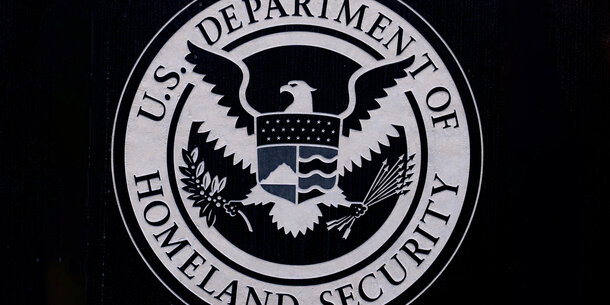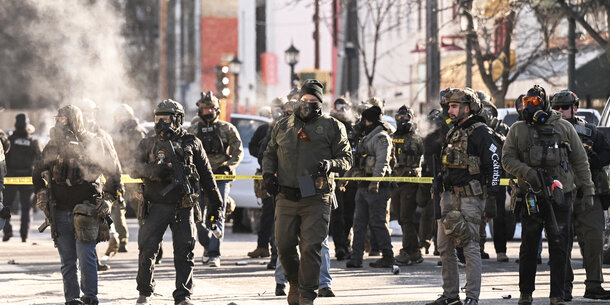In the weeks leading up to President Biden’s inauguration, Donald Trump’s supporters urged him to take various drastic measures to overturn the election results, including declaring a national emergency, invoking the Insurrection Act, imposing martial law, and “temporarily suspending the Constitution”. Talk of these potential end-runs around democracy even reached the White House, where individuals who had the ear of the president seemed to believe that simply saying the words “emergency powers” would somehow allow the president to remain in office indefinitely.
Biden supporters for the most part refused to be distracted and kept their focus on the transition. Some feared that discussing these schemes, even to debunk them, could give them more currency. Now that the transfer of power is complete, however, it is important to talk about why none of these plots would have worked. To be sure, emergency powers give the president a frightening amount of discretion in a crisis — but none allows the overturning of an election.
Take the rumors that Trump would declare martial law. This term does not have an established definition, but it usually refers to the military taking over civilian government in an emergency. While state officials have declared martial law many times and Congress has authorized its use in the past, the president currently has no authority to declare martial law. Any attempt to do so would be barred by the web of laws that Congress has enacted to govern the domestic activities of the armed forces — including the Posse Comitatus Act, which prohibits the use of federal troops to execute the law without express congressional authorization. According to well-settled principles of constitutional law, the president cannot act in a way Congress has forbidden unless the Constitution gives the president “conclusive and preclusive” power over the disputed issue. Far from giving the president total authority over these matters, the Constitution grants most of the relevant powers to Congress.
Nor could the president overturn the election results by invoking the Insurrection Act. This statutory exception to the Posse Comitatus Act does give the president broad latitude to deploy the military domestically. However, the purposes for which the Insurrection Act may be used are not infinite. Troops may be deployed to suppress armed insurrections or to execute the laws when local or state authorities are unable or unwilling to do so. Their role is then limited to quelling the violence or removing the obstruction to enforcing the law. The Insurrection Act has significant potential for abuse in the form of federal troops being deployed to suppress political dissent. But invoking it does not put the military “in charge” or suspend the normal functions and authorities of Congress, state legislatures, or the courts. It certainly does not grant the president the power to change the outcome of an election or overstay his term in office.
Some reports simply speculated that Trump might declare a national emergency to usurp the presidency. These rumors betrayed a fundamental misunderstanding of how emergency powers work in the United States. The declaration of a national emergency is not a magic wand that allows a president to do whatever he or she wants. It’s merely a procedural step necessary to unlock a number of other statutory powers that Congress has granted over time. A president would have to identify which of those powers he or she is invoking, and while there are well-placed concerns about what some of those powers might allow, none of them permit, for example, cancelling or rerunning an election.
More specifically, one of Trump’s attorneys reportedly urged him to seize voting machines by relying on a particular 2018 national emergency declared in Executive Order 13848. That order invokes the International Emergency Economic Powers Act to authorize economic sanctions on any “foreign person” that the president (or his designee) deems to be interfering in a U.S. election. The president has wide latitude to determine that such interference has taken place, and he or she can then freeze the assets of the offending person. But voting machines are presumably owned by the states who use them, not any foreign entity. And even if that weren’t the case, seizing the machinery would do nothing to alter the vote tallies and the states’ certifications, which already had been completed.
Perhaps the most off-base suggestion was that Trump should “suspend the Constitution” or “suspend civil liberties.” Simply put, this is impossible. The federal government is always bound by the Constitution and possesses only the powers it grants. The Constitution allows Congress to suspend the writ of habeas corpus under certain conditions, but neither Congress nor the president has the power to set aside any other constitutional right. As the Supreme Court explained in the 1866 case Ex parte Milligan, “the Constitution of the United States is a law for rulers and people, equally in war and in peace, and covers with the shield of its protection all classes of men, at all times, and under all circumstances.” In that decision, the Supreme Court affirmed that even during the Civil War — undoubtedly the most dangerous emergency this country has ever faced — the Constitution still applied.
This brings us to the final barrier that would have kept Trump from staying in office: the 20th Amendment. Nothing in the Constitution is more clear than that the president’s term ends after four years. Had Trump somehow succeeded in preventing Joe Biden from being inaugurated, he would still have ceased to be president at noon on January 20, and Nancy Pelosi, as speaker of the House, would automatically have become acting president. In the end, no legal mechanism was ever going to allow Trump to continue being president after he lost the 2020 election. The only path to a second Trump term would have been a full-blown coup d’état — something the military’s top leaders made clear they would not support.
There is good reason to worry about the nature and extent of U.S. emergency powers. The unchecked discretion that some of them confer creates far too much potential for abuse. Certain powers — including the Insurrection Act and the emergency sanctions authority — could indeed be used in ways that could undermine democracy and inhibit a fair and free election. But once an election has taken place and the votes have been tallied, there is no emergency power that enables a losing incumbent to stay in the White House. Allowing a contrary narrative to take hold would be just as dangerous to our democracy as the powers themselves.




